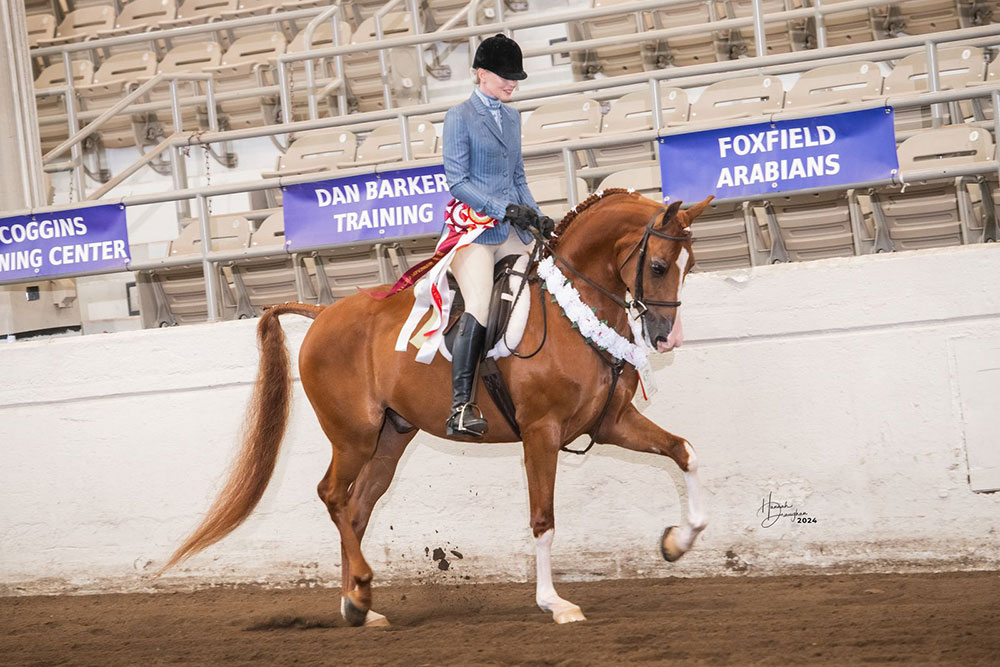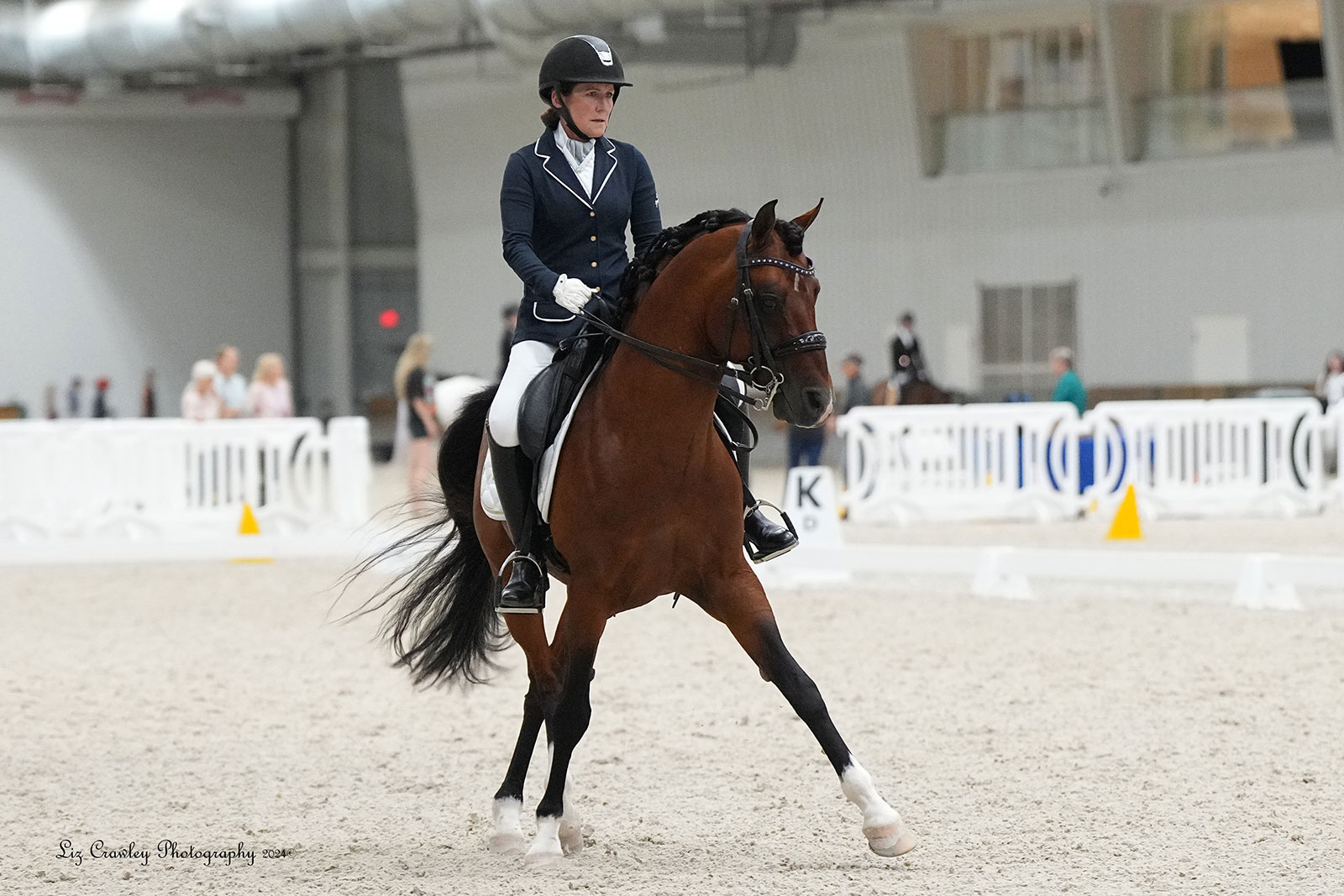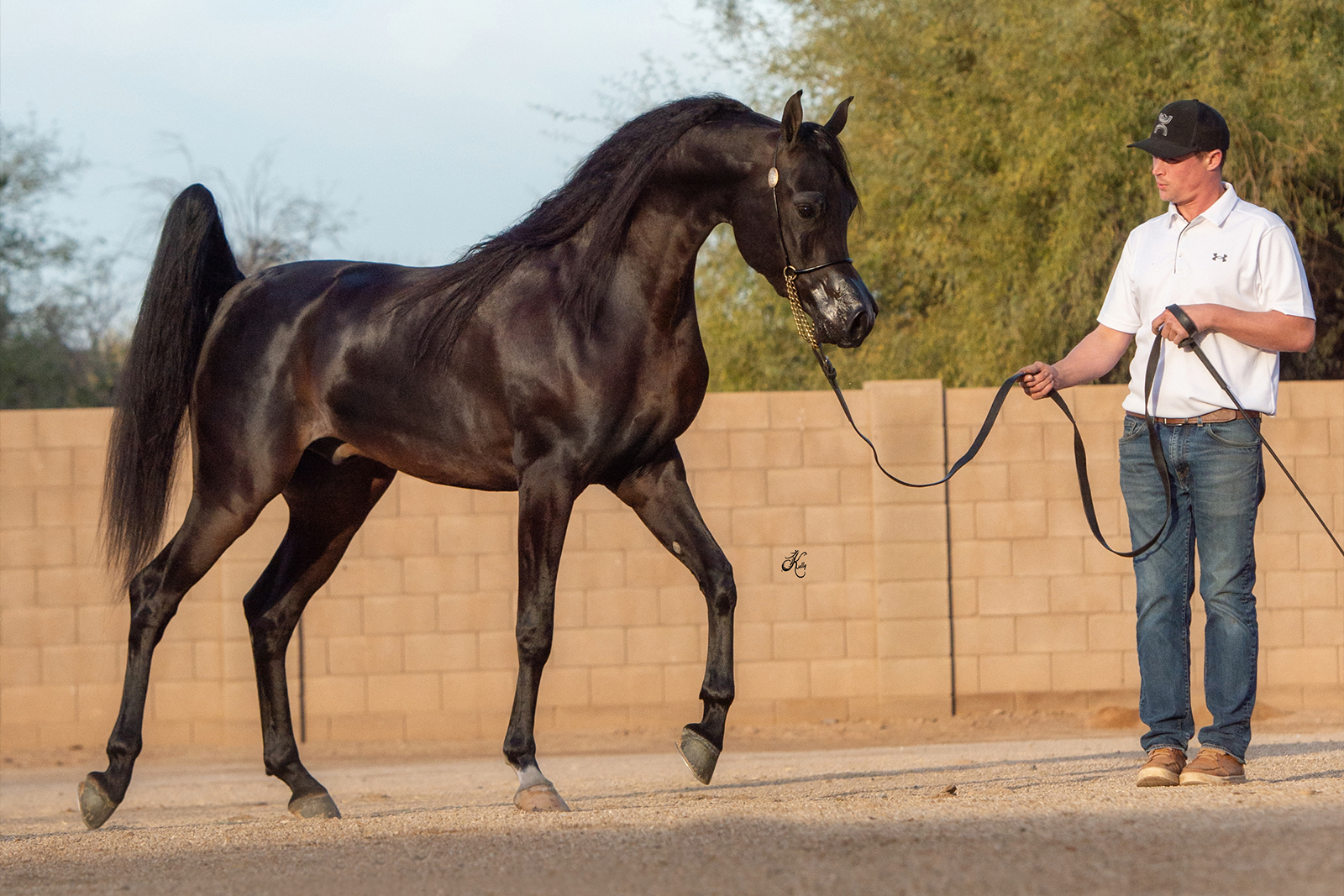Photo by April Visel
By Cindy Reich
As featured in the November 2013 Issue of Arabian Horse World.
I am taking care of a barn full of geriatric mares at the moment, and it’s caused me to reflect on their special needs. Our horses live longer lives because of better nutrition, health care, etc., and Arabians tend to live longer than other light breeds. The mares in the barn are all in their 20s, with several on the downhill slope toward 30! These older horses have special requirements that come with long life, so I thought it would be a good idea to review care of the older horse.
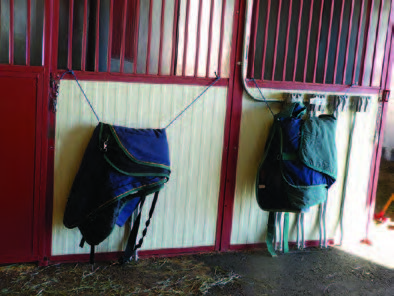
Older horses do not regulate their temperature as well in cold weather and may require blankets to cope with cold stress.
We here in the northern hemisphere are entering the winter months, and a lot of our time is spent putting blankets on and removing blankets. In general I don’t blanket horses unless absolutely necessary. Horses in our mountain climate grow great winter coats that are very effective in keeping them warm. As long as they have shelter to get out of wet weather, they are healthier without blankets. I do, however, make an exception for geriatric horses. They do not regulate their temperature well as they get older, so they tend to cold-stress more easily. Furthermore, they usually do not carry as much fat as younger horses do, which makes them more susceptible to cold. So it is blankets on/blankets off as many times a day as it takes. Right now, the nights are cold —30° F or lower but the daytime can be sunny and 60°. Blankets go on in the afternoon before the sun starts to go down and come off as soon as it is over 40°F.
Several stalls have radiant heaters with thermostats that are exposed to the ambient temperature of the barn. When the temperature dips below a certain level, the heater goes on automatically. These stalls are for those older mares that are unusually sensitive to cold — often mares that have come from warmer climates and need to adjust to our cooler temperatures. The stalls heat up quite quickly with the radiant heaters so their use must be monitored to ensure that the horses do not become dependent on them. Also, if radiant heaters are used, be sure that if the horse goes outside, there is not too much of a temperature change between the warm stall and the cold outside air. Radiant heaters can really make life comfortable for those mares that cold-stress easily.
Older horses should have their teeth checked every few months. Their teeth tend to grow at different rates as they age, and with the elongated teeth and wear patterns of older horses can come problems chewing and processing food. One sign of a dental problem is the presence of unchewed wads of hay or “quids” in the stall. If you fi nd unchewed wads of food in the feeder or stall, a dental exam should be performed. Studies have shown that older horses have a harder time chewing and digesting fi ber as they age. If you are having trouble keeping weight on an older horse, or it starts to lose weight suddenly, it is a good idea to have a dental exam. Often a simple frequent fl oating of the teeth can result in a dramatic change in the horse’s ability to eat and gain weight.
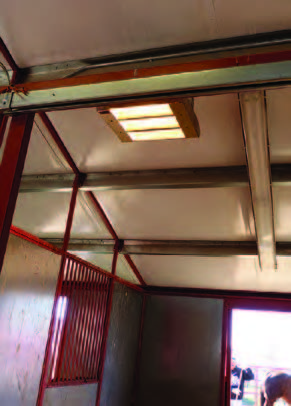
In cold climates, a radiant heater may make an older horse more comfortable.
Geriatric horses have different feed requirements and many have health problems that require careful attention to feed protocols. Some may have metabolic changes such as Cushing’s or glucose intolerance, which will necessitate a special diet. Often, senior feeds for horses are high in sugar — which, if the horse does not have metabolic issues, can help keep weight on and make the food more attractive to picky eaters. However, if the horse does have metabolic disease, feeding it a diet high in sugar is not a good idea. Another way to keep weight up on an elderly horse is through fat. High-fat foods such as rice bran or vegetable oil added to the diet can pack more calories into the horse’s diet without increasing the amount of food being fed. One caution in feeding a high-fat diet is to make sure that the horse does not have liver problems. If there is a liver dysfunction (not uncommon in older horses) then a high-fat diet will add to the liver problem. Horses with liver problems should be fed a low protein, low fat diet.
I tend to feed more concentrates to older horses — often a complete feed in pelleted form along with roughage. The concentrates are usually more easily digested and the horse derives more nutrition from them than, say, whole grains. The quality of the roughage is also important in feeding older horses. Stemmy, coarse hay or alfalfa may be difficult for the older horse to chew, resulting in choking episodes and possibly impaction colic. The hay should be soft and have a high ratio of grass heads to stems. The same is true for alfalfa. Often we will “sift” the alfalfa over a mesh grate and feed only the leaves if the alfalfa is stemmy, especially for horses that have trouble chewing. Soaking the hay or alfalfa can also make it softer and easier to chew. Beet pulp that has been soaked and softened is also good for older horses. Adding a bit of molasses to the beet pulp makes it more attractive for the horse to eat. (This is only for horses who are not glucose intolerant.) Soak only enough beet pulp to use on a daily basis as it does not keep more than a day or two at best after soaking and can become moldy if not used quickly.
Research has suggested that geriatric horses lose their ability to produce vitamin C, which is important in immune function. Therefore, it may be a good idea to supplement the diet of the aged horse with vitamin C to help boost the immune system.
Water can be overlooked as an important component of the senior horse’s management, especially as winter approaches. It has been my experience that older horses tend to prefer tepid to slightly warm water to drink in cold weather. Therefore, I make sure that the waterers have the heaters switched on for the winter, not only for de-icing, but to ensure that the horses drink as much water as possible. If you don’t have automatic waterers you may want to consider a tank heater or a heated bucket (for a stalled horse) during the winter months.
As with older humans, geriatric horses often have problems with arthritis. Consult your veterinarian as to what supplements might be helpful for joint problems. The saying “use it or lose it” is as important to the older horse as it is to aging humans. It is necessary to keep the older horse moving to keep the joints limber and the horse more comfortable. It’s not uncommon to see horses in their 20s still used for riding, or even winning in the showring. My best show horse was still winning classes under saddle well into his 20s. The important thing is moderation. Horses will usually let you know how much exercise is enough. If they show a real reluctance to move, or are unusually sore after exercise, you should have them evaluated by a veterinarian. A pasture situation is best for most older horses because they are moving about continually. If they are in a stall or small paddock, and are capable of being ridden, both horse and rider can enjoy slow, easy excursions that do not place too many demands on aging joints. Another option is a horse exerciser. This is not to be confused with a “hot walker.” Hot walkers or overhead walkers were designed to cool out a horse that has just been heavily exercised. They should never be used for fresh horses, aged or otherwise. A horse exerciser is designed specifi cally for exercise in which the horse is not restrained. The exerciser speed can be set for anything from a sedate walk to a brisk trot.
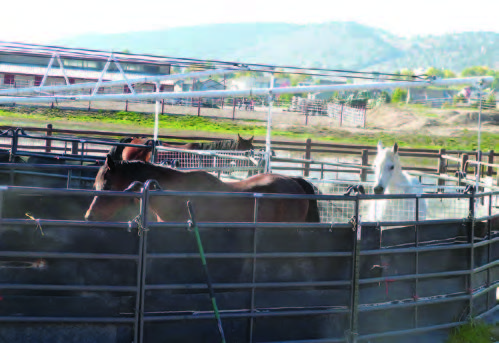
Older horses still need exercise to maintain optimum health. Walking at a sedate pace on an exerciser will keep them fit and prevent stiffness.
In addition to arthritis and joint problems, many older horses have foot or hoof issues, especially laminitis. Because glucose intolerance and Cushing’s disease are more common in older horses, so is the incidence of laminitis (founder) as a result of both conditions. Therefore, attention must be given not only to diet (overly fat oldsters put a lot of stress on laminitic feet) but also to shoeing and foot care. Although it is preferable for geriatric horses to go barefoot if they have healthy feet, the reality is that many have foot issues requiring the use of shoes and sometimes pads. Monitor the feet carefully and make sure that any signs of lameness or tenderness are checked out immediately. In winter, keep the hooves picked out and prevent the accumulation of snow and ice as it can result in sole abscesses or sore feet at best.
Vaccination of the older horse has been a somewhat controversial topic. There is some research to suggest that similar to older humans, the older horse’s immune system becomes less effective as it ages. Therefore, they might not mount as strong a response to a vaccination as a younger horse. However, there is another school of thought that suggests horses that have been vaccinated for decades may have a sufficient titer to many diseases without yearly revaccination. You should consult with your veterinarian on what is the best vaccination protocol for your geriatric horse. As with all horses, it is a good idea to do fecal tests to determine whether or not a horse needs to be dewormed. If the horse is not carrying a heavy egg load, it is debatable whether it is necessary to deworm it. Several fecal tests may be needed to make sure that the test is not occurring during the migratory stage when egg counts may be low. However, if the horse consistently has low egg counts in the feces, it may not be necessary to deworm as frequently.
Horses love routine schedules and it seems to me that senior horses become set in their routines as they age. Therefore I try to keep their schedules as constant as possible. Other than feeding times (which are intentionally within a one- to two-hour frame), the geriatric horses are turned out in the same order and at the same times. All of them have buddies or groups that they are turned out with to keep them happy and content. Often older horses get less confident and do better with a buddy of some sort — even if it’s a goat or a sheep if no other horses are around. Their need for companionship may come from losing status in the pecking order or even from failing eyesight. Some older horses make great baby sitters for weanlings — while others HATE having youngsters around. You have to be creative to find out what works best for each individual. Horse’s mental health and happiness are of prime importance and part of that mental health derives from bonding and routine. Some horses seem to have periods during which they become confused or forgetful — just like humans. It is important to know each horse’s personality and routine so that episodes of confusion can be identified. Usually they are minor, and having a set routine helps to keep the horse on track and focused. However, if your older horse suddenly has a dramatic behavioral change, it is important to have a veterinary exam.
Having a basic health check several times a year for geriatric horses — eyes, teeth, feet, joints, and blood work if necessary, can go a long way in preventing problems before they occur. I consider it an honor and privilege to take care of these equine “senior citizens.” They have earned the right to the best of care in their golden years and I can watch them with their quiet dignity in the pastures for hours.




